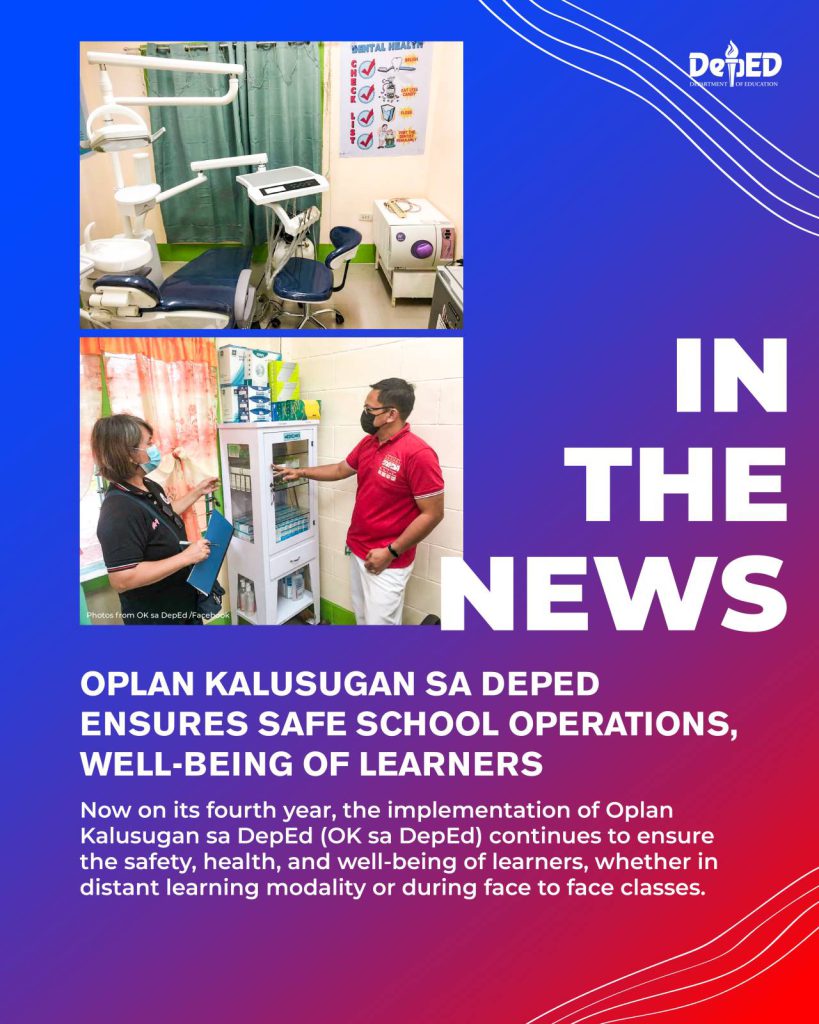 |
April 13, 2022 – Now on its fourth year, the implementation of Oplan Kalusugan sa DepEd (OK sa DepEd) continues to ensure the safety, health, and well-being of learners, whether in distant learning modality or during face-to-face classes.
This is the major finding of the consultation and progress monitoring visits held by the Department’s Bureau of Learner Support Services (BLSS) in selected schools in the National Capital Region (NCR) on March 15-16, 2022.
“We are pleased to see firsthand how the schools, with full support from their respective Schools Division Offices (SDOs) and the Regional Office (RO), have continued to implement the various programs under OK sa DepEd for the past two years while most learners have remained under distant learning modality, and how they ensure that the same will be strengthened as face-to-face classes resume,” BLSS Director Lope B. Santos III said.
“BLSS thanks all the personnel of the RO, the SDOs, and the schools we have visited for their active participation in our monitoring and their diligent preparations for our visit,” Dir. Santos added.
Officially launched in 2018 through DepEd Order No. 28, OK sa DepEd is the convergence of DepEd’s school health and nutrition programs for their effective implementation at the school level. It highlights six flagship programs, namely, the School-Based Feeding Program (SBFP) complemented by other nutrition support programs; Medical, Dental, and Nursing Services, including the School Dental Health Care Program (SDHCP); Water, Sanitation, and Hygiene (WASH) in Schools (WinS) Program; Adolescent Reproductive Health; National Drug Education Program supported by comprehensive tobacco control; and the School Mental Health Program.
Dir. Santos, joined by RO and SDO personnel, led national program coordinators from the School Health Division, in inspecting school health and nutrition facilities including the newly established medical and dental clinics under the SDHCP, toilets and handwashing facilities as part of the WinS Program, and feeding facilities and kitchens for the SBFP.
Employing rapid participatory appraisal, the two-day field visit served as an opportunity for DepEd officials and program coordinators across governance levels to identify policy gaps, propose program recommendations, and explore technical assistance necessary for effective and efficient program implementation.
The activity also provided a venue for reporting of major program accomplishments and sharing of the good practices of the schools, the SDOs, and the RO in the implementation of OK sa DepEd, as well as the announcement and reiteration of key program directions by BLSS representatives.
“While only selected schools have been visited for this monitoring activity, rest assured that all other schools in the region give utmost importance to OK sa DepEd as a means to support our learners’ health,” DepEd NCR Regional Director and OIC-Undersecretary Wilfredo E. Cabral said.
The monitoring of schools in NCR is first in a series of monitoring visits scheduled this year to assess the implementation of OK sa DepEd. Late last year, BLSS conducted monitoring visits to schools in the Ilocos Region, Central Luzon, CALABARZON, Bicol Region, Davao Region, and SOCCSKSARGEN, particularly for the SBFP and the SDHCP.
END


